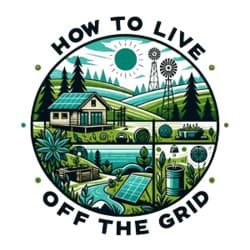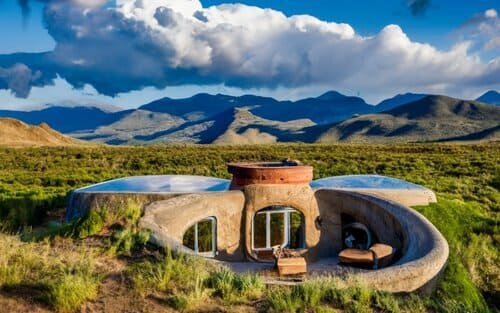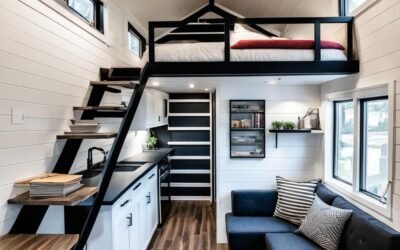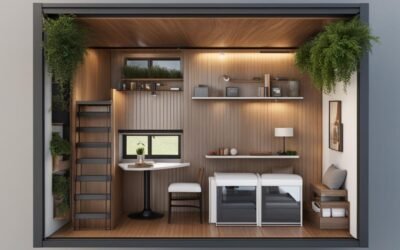When it comes to finding a living space that combines simplicity, functionality, and mobility, mini homes on wheels are the perfect solution. These tiny houses on wheels, also known as mobile tiny homes or portable homes, offer a unique approach to compact living that is gaining popularity among individuals who value freedom, sustainability, and financial flexibility.
Mini homes on wheels range in size from 100 to 400 square feet, embodying the philosophy of “less is more.” Despite their small size, these homes are thoughtfully designed to maximize space efficiency, with clever storage solutions and innovative layouts. They are not only aesthetically pleasing but also environmentally friendly, allowing individuals to embrace a smaller carbon footprint and embrace an eco-conscious lifestyle.
One of the most appealing aspects of mini homes on wheels is their mobility. With the ability to pick up and go, homeowners can embark on road trips or change their scenery with ease, all while enjoying the comforts of home. Whether it’s a spontaneous adventure or a desire for flexibility within their own backyard, these homes offer a level of freedom that is unparalleled.
The tiny home movement has also fostered a vibrant community of like-minded individuals who share their experiences and tips through social media and events. Being a part of this community provides a sense of camaraderie and support, making the journey of living in a mini home on wheels even more rewarding.
Financial advantages are another significant draw of mini homes on wheels. They offer an affordable alternative to traditional homeownership, with lower upfront costs and utility bills. By embracing compact living, individuals can achieve financial freedom and allocate their resources to other priorities in life.
The design creativity showcased in mini homes on wheels is remarkable. Despite limited space, these homes are crafted with functional and visually appealing elements that make them a joy to live in. From multifunctional furniture to efficient layouts, every detail is thoughtfully considered to create a comfortable and welcoming living space.
Key Takeaways:
- Mini homes on wheels epitomize the “less is more” philosophy of compact living.
- They offer mobility, allowing homeowners to embark on road trips or change their scenery with ease.
- Mini homes on wheels foster a vibrant community of like-minded individuals who share experiences and tips.
- Financial benefits include lower upfront costs and utility bills, offering an affordable alternative to traditional homeownership.
- Despite their size, mini homes on wheels showcase remarkable design creativity, with functional and visually appealing elements.
The Advantages of Tiny Homes on Wheels
Tiny homes on wheels offer a range of advantages that make them an appealing housing option. Firstly, their mobility and flexibility allow homeowners to easily transport and relocate their homes, providing a sense of freedom and adaptability. Secondly, tiny homes are often more affordable than traditional houses, with lower construction and maintenance costs. They also promote a minimalist lifestyle, encouraging individuals to downsize and live with fewer possessions. Sustainability is another advantage, as these homes are designed to be energy-efficient and have a smaller environmental footprint. Additionally, the compact size of tiny homes results in reduced maintenance and cleaning. These homes are versatile and can serve various purposes, such as primary residences, vacation homes, or guest houses. Finally, the reduced cost of owning a tiny home on wheels can lead to financial freedom, allowing individuals to allocate funds to other priorities.
| Advantages of Tiny Homes on Wheels |
|---|
| 1. Mobility and flexibility 2. Affordability 3. Minimalist lifestyle 4. Sustainability 5. Reduced maintenance and cleaning 6. Versatility 7. Financial freedom |
With their numerous advantages, mini homes on wheels provide homeowners with a unique and fulfilling way of living. The ability to easily transport and relocate these homes offers a level of freedom and adaptability not found in traditional housing. Furthermore, the affordability of tiny homes on wheels allows individuals to achieve financial freedom and reallocate resources to other priorities. By promoting a minimalist lifestyle, these homes encourage individuals to downsize and live with fewer possessions, promoting a sense of simplicity and mindfulness. Additionally, tiny homes on wheels are sustainable, designed to be energy-efficient and have a smaller environmental impact. The compact size of these homes also translates into reduced maintenance and cleaning, freeing up more time and resources for other activities. Furthermore, the versatility of these homes allows them to serve various purposes, from being a primary residence to a vacation home or guest house.
Designing Tiny Homes on Wheels
Designing a tiny home on wheels involves careful consideration of various factors to create functional, comfortable, and visually appealing living spaces. Architects and homeowners must address weight distribution and structural integrity to ensure safety during transportation. By maximizing the use of space and employing innovative design strategies, tiny homes on wheels can offer a surprisingly comfortable and efficient living experience.
Efficient Space Utilization
In tiny homes on wheels, every square inch counts. Designers utilize multifunctional furniture and creative storage solutions to make the most of limited space. For example, seating can double as storage, and beds can fold away, allowing for flexible use of the living area. By prioritizing efficiency and functionality, designers create layouts that maximize the usability of every corner.
Compact Kitchens and Multipurpose Living Areas
In tiny homes, the kitchen is often compact yet fully functional. Designers focus on essential appliances and utilize space-saving techniques, such as built-in storage solutions and collapsible countertops. The living area may serve multiple purposes, such as a living room during the day and a bedroom at night. Versatility is key to ensure that each space serves its purpose without sacrificing comfort.
Specialized Plumbing and Utility Systems
Tiny homes on wheels require specialized plumbing and utility systems to accommodate their compact size and mobility. Compact and efficient systems, such as tankless water heaters and composting toilets, minimize the space and resources needed. These systems are designed to provide the necessary amenities while minimizing the impact on weight distribution and overall functionality.
Visually Appealing Interior Design
Interior design choices play a significant role in creating visually appealing and comfortable living spaces. Colors, textures, and materials are carefully selected to create a sense of harmony and openness. Clever use of lighting, such as natural light through windows and well-placed fixtures, enhances the ambience and makes the space feel larger. Thoughtful interior design can transform a tiny home on wheels into a cozy and inviting retreat.
“In tiny homes on wheels, thoughtful design and attention to detail combine to create beautiful and functional living spaces.”
– Jane Smith, Tiny Home Designer
Designing tiny homes on wheels requires a balance between functionality, aesthetics, and the unique challenges posed by mobility. Architects and homeowners embrace creative solutions to optimize space, incorporate versatile layouts, and ensure essential systems are tailored for compact living. This careful design consideration results in beautifully crafted mini homes on wheels that offer a remarkable blend of comfort, efficiency, and mobility.
| Advantages | Challenges |
|---|---|
| Increased mobility and flexibility | Legal and zoning restrictions |
| Affordability in construction and maintenance | Finding suitable parking spaces |
| Promotes minimalist lifestyle | Access to utilities |
| Sustainability and reduced environmental footprint | |
| Reduced maintenance and cleaning | |
| Versatile usage options |
Table: Advantages and Challenges of Tiny Homes on Wheels
Challenges and Considerations of Mobile Living
 While mobile living offers numerous advantages, it also presents challenges that individuals must navigate. From zoning and legal considerations to finding suitable parking spaces and accessing utilities, mobile living requires careful planning and research.
While mobile living offers numerous advantages, it also presents challenges that individuals must navigate. From zoning and legal considerations to finding suitable parking spaces and accessing utilities, mobile living requires careful planning and research.
Zoning and Legal Considerations: Living in mobile homes can be subject to zoning restrictions, determining where these homes can be parked and occupied. Individuals may face limitations or regulations that dictate the locations where mobile homes are allowed, often varying from one jurisdiction to another.
Finding Suitable Parking Spaces: One of the challenges of mobile living is securing affordable and suitable parking spaces for mobile homes. Long-term options can be limited, especially in areas where mobile home communities or designated parking areas are scarce.
Access to Utilities: Mobile homes require access to basic utilities such as water, electricity, and sewage connections. Ensuring these essential services are available can be a consideration when choosing a location for mobile living.
“Living in a mobile home requires careful planning, research, and considerations for zoning, parking, and utilities.”
Despite these challenges, the benefits of mobile living often outweigh the obstacles. The flexibility to explore new places, the ability to embrace a minimalist lifestyle, and the opportunity to create a unique living space are just a few of the advantages that make mobile living a compelling option for many individuals.
| Challenges | Considerations |
|---|---|
| Zoning and Legal Restrictions | Research regulations in different jurisdictions |
| Finding Suitable Parking Spaces | Investigate long-term options and availability |
| Access to Utilities | Ensure water, electricity, and sewage connections |
Overcoming these challenges may require resourcefulness and networking among mobile homeowners. However, with proper planning and preparation, individuals can embrace the benefits of mobile living and enjoy the freedom and flexibility it offers.
Tiny Homes on Wheels for Retirement
 Retirement is a time to embrace new adventures and experiences, and what better way to do that than with a tiny home on wheels? Mini homes on wheels are not just for the younger generation; they also appeal to retirees who desire a more active and mobile lifestyle in their golden years.
Retirement is a time to embrace new adventures and experiences, and what better way to do that than with a tiny home on wheels? Mini homes on wheels are not just for the younger generation; they also appeal to retirees who desire a more active and mobile lifestyle in their golden years.
Downsizing to a tiny home offers retirees a more eco-conscious and flexible housing option. These compact, mobile homes provide financial benefits as well, being more affordable to build and maintain than traditional homes. With reduced expenses and lower utility bills, retirees can allocate their resources to things that truly matter to them.
But it’s not just about financial savings; tiny homes on wheels also require less time and effort for household chores. With their smaller size, cleaning becomes a breeze, allowing retirees to spend more time on activities they enjoy, such as traveling, pursuing hobbies, or spending time with loved ones.
“Living in a tiny home on wheels gives me the freedom to explore new places and have a sense of adventure in my retirement,” says Linda, a retiree who has embraced the mobile living lifestyle. “I can easily pack up and go wherever I want, without the hassle of maintaining a large house. It’s liberating!”
Benefits of Tiny Homes on Wheels for Retirees:
- More affordable construction and maintenance costs compared to traditional homes
- Reduced utility expenses
- Less time and effort spent on household chores
- Flexibility to travel and explore new places
- Promotes a minimalist lifestyle
- Opportunity for passive income through vacation rentals
If you’re a retiree looking to downsize and embrace a more active and flexible lifestyle, consider the possibilities that tiny homes on wheels offer. Experience the joy of compact living while enjoying the freedom to travel, engage with a vibrant community, and create unforgettable memories in your retirement years.
| Financial Benefits | Lifestyle Benefits | Environmental Benefits |
|---|---|---|
| More affordable construction and maintenance costs | Less time and effort spent on household chores | Reduced carbon footprint |
| Lower utility expenses | Flexibility to travel and explore | Encourages sustainable living |
| Potential for passive income through vacation rentals | Opportunity to connect with a vibrant community |
Conclusion
Mini homes on wheels offer a unique and fulfilling way of living, embracing simplicity, mobility, and sustainability. These mobile tiny homes provide individuals with the freedom to explore new places, cultivate a sense of community, and live a more affordable and environmentally conscious lifestyle.
Whether you are looking to downsize, seeking a retirement home, or desiring financial and personal freedom, mini homes on wheels offer a viable alternative to traditional homeownership. These compact living spaces allow you to embrace a minimalist lifestyle, reduce your carbon footprint, and live a life less ordinary.
Join the growing movement of homeowners who have chosen mini homes on wheels for their flexibility and versatility. Experience the joy and fulfillment that comes from embracing a simpler way of life. Start your journey towards a more sustainable and mobile future today!
FAQ
What are tiny homes on wheels?
Tiny homes on wheels are compact living spaces, typically ranging from 100 to 400 square feet, that are designed to be mobile. They provide a modern and sustainable alternative to traditional homeownership, allowing individuals to live a simpler and more flexible lifestyle.
What are the advantages of tiny homes on wheels?
Tiny homes on wheels offer a range of advantages. They provide mobility and flexibility, allowing homeowners to easily transport and relocate their homes. These homes are often more affordable than traditional houses, promoting financial freedom. They also promote a minimalist lifestyle, are energy-efficient, and have a smaller environmental footprint.
What considerations are involved in designing tiny homes on wheels?
Designing a tiny home on wheels requires careful consideration of weight distribution and structural integrity for safe transportation. Maximizing space utilization is crucial, with strategies like multifunctional furniture and creative storage solutions. Specialized plumbing and utility systems accommodate the compact size and mobility of these homes.
What challenges are associated with mobile living?
Mobile living can present challenges such as zoning restrictions on where mobile homes can be parked and occupied. Finding suitable, affordable parking spaces for mobile homes may also be challenging. Access to utilities, such as water, electricity, and sewage connections, can be another consideration that needs to be addressed.
Are tiny homes on wheels suitable for retirees?
Yes, tiny homes on wheels are a great option for retirees who desire a more active and mobile lifestyle in their golden years. They offer financial benefits, require less maintenance, and provide flexibility for travel or generating passive income. Tiny homes allow retirees to downsize and enjoy a more eco-conscious and affordable living option.













